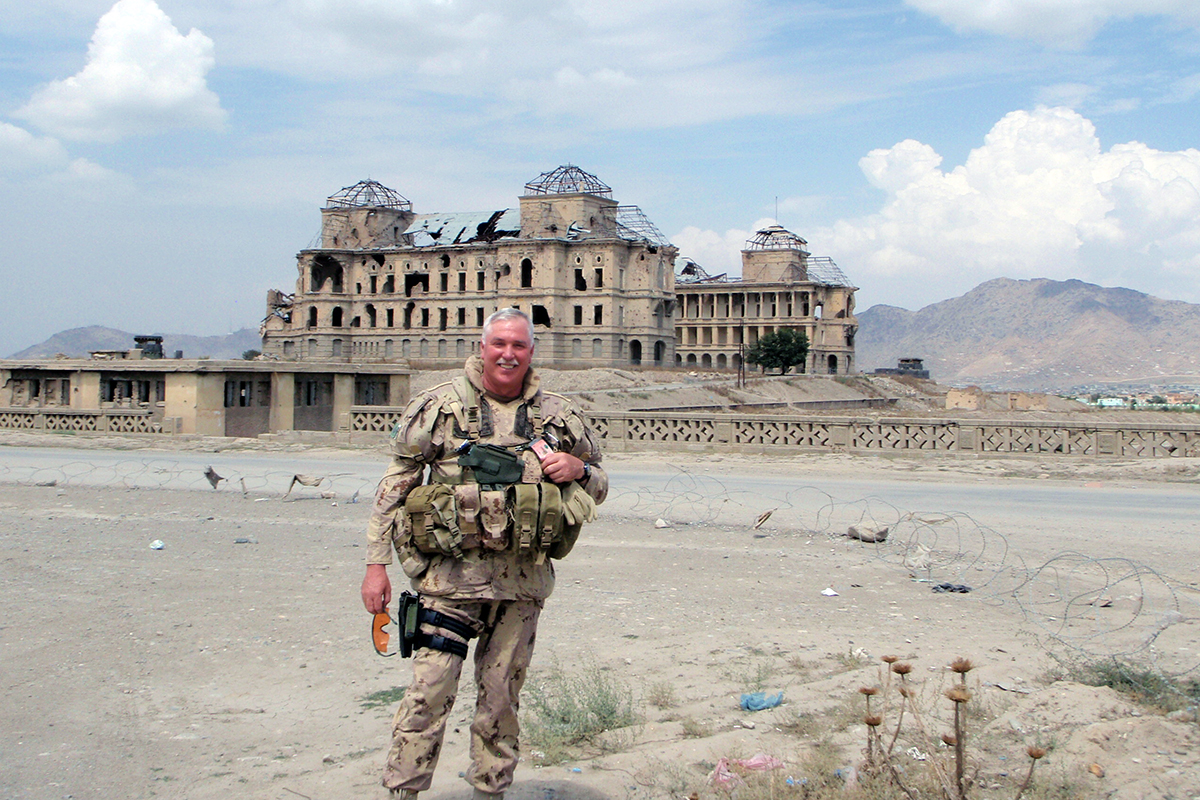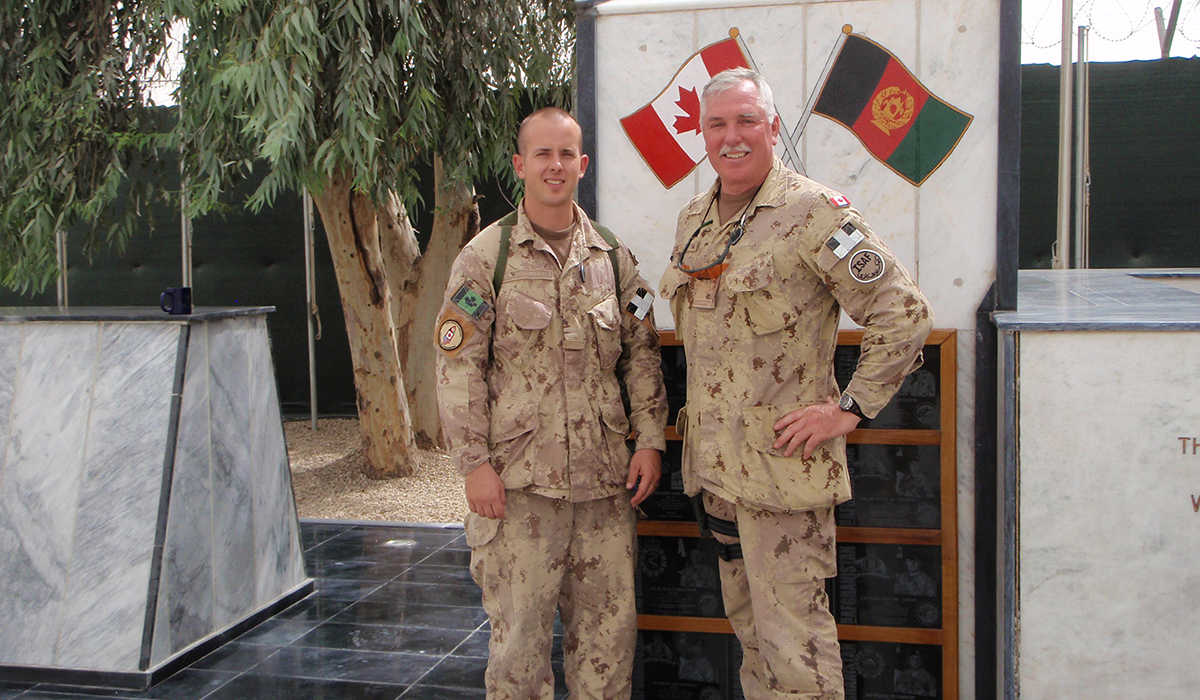Explore Greater.
Victoria is a true one-of-a-kind land on the Pacific coast. Sign up to have travel guides, upcoming events, travel tips, and more delivered to your inbox.
Posted on October 18, 2016

Canadian Forces reservist Randal Evans doesn't live a life of predictability, but there's one day of the year when the Victoria man knows exactly where he's going to be. If it's Remembrance Day, then the retired brigade sergeant major is going to be standing at a cenotaph - if not in his home town of Victoria, B.C., then wherever he is in the world at that moment.
Randal's father started taking him to Remembrance Day ceremonies in Victoria when he was just a child. And when Randal became a father, he passed the tradition on to his own children, who not only carry on their own cenotaph visits now that they're adults but have followed their father, uncles and grandfather into service as reservists with Victoria's Canadian Scottish Regiment.
"I've never missed a Remembrance Day at a cenotaph," says Randal, whose own reservist experience took him to Afghanistan for seven months in 2010 as senior enlisted advisor and mentor to the Afghanistan Uniform Police. "It's a really inspirational day for remembering not just the buddies you lost, but also those who went before you."

With its rich military history and active militia, Victoria has been an ideal community for three generations of reservists in his family adds Randal. The region's "perfect climate" and scenic beauty are pretty nice reasons for sticking around, too. "I've visited a lot of places in the world, but I've never found any place that I like as much as Victoria," says Randal.
The Canadian Scottish Regiment has been part of Greater Victoria's rich military history for more than a century. And someone from the Evans family has in turn been part of that regiment all the way back to 1956, when Randal's father Douglas enlisted. Since then, Randal and brothers Gary and Jamie, as well as two of Randal's three children, have served with the regiment.
"I joined in 1973, and stayed until May of this year," says Randal. "In those days, lots of people were joining when they were 16 or 17, still at high school. It's an exciting job for a young guy, learning to use weapons and having the chance to be part of something important."
Reservists typically commit to training and practising one or two nights a week, plus weekend time. Randal compares it to a part-time job. Canada's 18,000-plus army reservists play an important role in combat, typically accounting for a fifth or more of all Canadian troops on the ground internationally.
Up until he retired in 2009, Randal's full-time job was as a firefighter and police officer for the municipality of Esquimalt, in the years when it had a joint force. While he didn't know it then, that combination of police/fire experiences made him the perfect candidate for the Afghanistan job when the opportunity came up the year after he retired.
"Not only were Canadians fighting a war in Afghanistan at that time, we also had a lot of people liaising with local government, sharing their knowledge of building wells - basically providing training behind the scenes to help the country be able to do all these things themselves," recalls Randal.
"In Afghanistan, all police and fire work is administered nationally, and the one general who controls it is both the police chief and the fire chief. I was a bit of an anomaly because I had the same blend, so I was picked to go there and mentor a new sergeant major who was going to be taking over police and fire operations all over the country."

The work was extremely dangerous. Feeling the impact of engaging with well-armed and protected military forces, the Taliban at that time had shifted more of its focus to killing police officers instead. Randal, his interpreter and the terrified new Afghani sergeant major travelled to communities all over the country to consult and train local police and firefighters, ducking mountain-top snipers in Jalalabad and passing by a scene of roadside carnage mere minutes after an improvised explosive device had blown up a vehicle.
Listening to the military experiences of other veterans is an aspect of Remembrance Day in Victoria that Randal relishes. Both he and Second World War veteran Gordon Quan - another lifelong Greater Victoria resident, whose own story can be found here - say conversations with other veterans, usually at a Royal Canadian Legion branch, are as much a part of their November 11 tradition as the cenotaph ceremony.
Randal's is one of more than 40,000 Canadian Armed Forces members who have served in Afghanistan. Victoria's Canadian Scottish Regiment (Princess Mary's) Regimental Museum recently opened an exhibit honouring the 158 Canadian soldiers who lost their lives during service there.
"Truthfully, I think we did make a difference over there," says Randal. "In those years, we pushed back the Taliban. We raised the standard of military and police training. We provided mentors in the areas of for police, fire, politicians, and the army. Our time there was not wasted."
Make your next visit to Victoria a chance to learn more about the Greater Victoria's role in Canada's military history. In addition to the regimental museum, the region is home to the CFB Esquimalt Naval and Military Museum, the BC Aviation Museum, scenic Fort Rodd Hill, and the Ashton Armoury Museum preserving the history of four local Canadian Forces units: communications; military police; logistic; and medical.